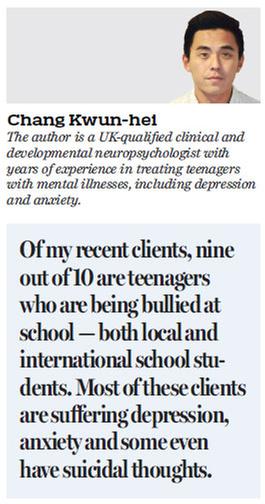Joint effort needed to help anxious, depressed students

'Yesterday at school, we talked about feelings. My teacher asked us if we have ever felt love before. I said yes. But the truth is, I have never felt the feeling of being loved. Sometimes I just feel that I am better off ending my life." These words came out of the mouth of my 10-year-old client who was referred by his parents to come to see me for social skills training because he was bullied by his peers at school. Of my recent clients, nine out of 10 are teenagers who are being bullied at school - both local and international school students. Most of these clients are suffering depression, anxiety and some even have suicidal thoughts.
About 70.8 percent of 1,800 pupils from eight local secondary schools polled by the Department of Social Work at the Chinese University of Hong Kong between January and April said they had been victims of school violence, slightly higher than in the West and Asian regions.
Bullying can be in different forms. The most common types of bullying in Hong Kong are physical aggression and verbal abuse such as name-calling, threatening, and intimidation. Other forms of bullying can be cyberbullying through texts and social media.
Both boys and girls are bullied. Children as young as pre-school age all the way through college are bullied. Bullying tends to spike at the end of kindergarten through primary school, then slowly declines at the end of secondary school. Bullying, especially chronic bullying, can have serious developmental implications. Bullying has huge negative impacts on a child's self-perception and self worth.
Bullying also leads to anxiety and depression. Bullied children can experience fear in and out of school. In chronic and severe cases, bullied children experience symptoms of post-traumatic stress disorder (PTSD).
Often, interventions for bullying need to be multifaceted and involve several people to be effective. The following suggestions are for those who play different roles in a child's life.
Parents - recognize when your child is acting differently. Talk and listen to your child and try to understand and validate his/her experience. Let his/her teacher know something is, or might be, happening at school. Seek out professional supports such as talking to the school counselor or psychologist.

Teachers - understand that bullying is common and set firm guidelines on establishing mutual respect among students. Be aware of subtle bullying behavior such as teasing and ostracizing. Work closely with the school counselor or psychologist to address bullying situations and support students who are victimized.
School counselors - teach students tools for dealing with bullying situations, including basic and more sophisticated social skills. Help them to understand the impact of their behaviors on others. Help the bullied students find meaning and purpose. Help them identify safe people and safe places. Be a consistent, kind, and compassionate presence in their life. Parents will feel helpless too. Therefore, provide guidance and guide parents in supporting their child through a difficult time. Give them suggestions and reassure them.
A successful intervention depends on the nature and severity of bullying and the impact on the child. An intervention can range from teaching a child strategies, talking to teachers and school counselors, to changing schools to a place where they are better understood or don't have the history of their reputation.
Finally, to all bullied children. You must tell someone about what happened even if you believe that it will not help. Speak to your parents. Speak to your teachers. Talk to the school counselor or psychologist. Walk away and avoid the bullies if possible. When you are bullied, try not to let them see they are getting to you. This is extremely hard yet bullies love to get a reaction from you. Don't give them the satisfaction. Try your best to find at least one person who is nice to you and respects you. Stay with that person. Spend more time with a teacher or counselor you trust. Be strong and remember you are an individual with talents who has a lot to offer and that your rights and space deserve respect.
If you experience negative feelings, please call: The Samaritans 2896 0000 (24-hour, multilingual), Suicide Prevention Centre 2382 0000 or the Social Welfare Department 2343 2255. The Hong Kong Society of Counseling and Psychology provides a WhatsApp hotline in English and Chinese: 6218 1084.
(HK Edition 09/04/2017 page11)
Today's Top News
- Putin-Zelensky meeting not being planned, intense mutual attacks persist
- China, Japan, ROK urgently need an FTA
- From humanoids to parallel intelligence
- Shared wartime history unites nations, envoy says
- Mutual trust reaffirmed in visit
- 12 dead, 4 missing after bridge collapses in Qinghai






























